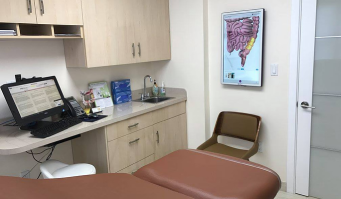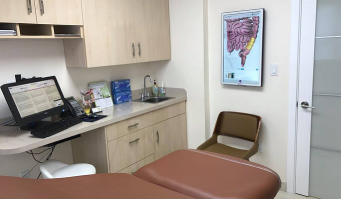Colonoscopy
What Happens During a Colonoscopy:
A colonoscopy, typically lasting 30-60 minutes, is performed by a qualified doctor. You will be administered medications through your vein to induce relaxation and drowsiness. As you lie on your left side on the examination table, the doctor inserts a colonoscope, a long, flexible tube roughly 1/2-inch in diameter. This instrument transmits an image of your colon’s lining, allowing the doctor to examine it for abnormalities. The scope is inserted through the rectum and advanced to the large intestine’s far end.
The flexible nature of the scope enables the doctor to navigate the colon’s curves. You may be asked to change positions occasionally to facilitate this movement. Additionally, air is introduced into the colon through the scope, expanding it for improved visibility.
While mild cramping may occur during the procedure, taking slow, deep breaths can help alleviate it. Upon completion, the colonoscope is slowly withdrawn while the bowel lining is meticulously examined.
If abnormalities are encountered, the doctor may extract small tissue samples for analysis (biopsy) or remove abnormal growths (polyps). In many cases, colonoscopy allows for accurate diagnosis and treatment, eliminating the need for major surgery.
Preparation for a Colonoscopy:
Before undergoing a colonoscopy, it is crucial to inform your doctor of any underlying medical conditions, including:
- Pregnancy
- Lung conditions
- Heart conditions
- Allergies to any medications
- Diabetes or use of blood-clotting medications; adjustments may be necessary.
Do not discontinue any medication without first consulting your doctor.
In some cases, antibiotic use before the procedure may be necessary if you:
- Have an artificial heart valve
- Have been advised to take antibiotics before dental or surgical procedures
Dietary and Fluid Restrictions:
Prior to your colonoscopy, you may be subjected to dietary and fluid restrictions, which will vary based on your doctor’s instructions. Limiting or eliminating solid foods for a few days before the test may be required. Additionally, you may need to take oral laxatives.
Ensure you arrange for someone to drive you home after the colonoscopy. Due to the sedating medication administered during the procedure, driving or operating machinery for 8 hours afterwards is unsafe.
Post-Colonoscopy Care:
After your colonoscopy:
- You will be monitored in a recovery room for approximately 30 minutes.
- Mild cramping or gas sensations may be experienced, but these typically subside quickly.
- Resuming your normal diet is recommended.
Read your discharge instructions carefully. If biopsies or polyp removals were performed, certain medications, such as blood thinners, may need temporary avoidance.
While rare, complications such as bleeding and colon puncture can occur following a colonoscopy. Contact your doctor immediately if you experience:
- Excessive or prolonged rectal bleeding
- Severe abdominal pain, fever, or chills

“Thank you for visiting Forest Hills Gastroenterology & Liver Disease, my goal is to treat my patients in a highly personalized manner and I am dedicated to give you the utmost attention and respect that you deserve. For more infromation on this disease or to schedule a consultation with me, please give us a call or book a tele-health appointment online.”
Albert Shalomov
Dr. Albert Shalomov, MD
Disclaimer: Educational Infromation, Not Medical Advice
It’s important to remember that the information provided here is intended for educational purposes only and should not be misconstrued as definitive medical advice. Always seek the guidance of a qualified gastroenterologist for accurate diagnosis and treatment of any specific gastrointestinal condition. Only trained healthcare professionals can provide personalized recommendations and ensure your well-being.




